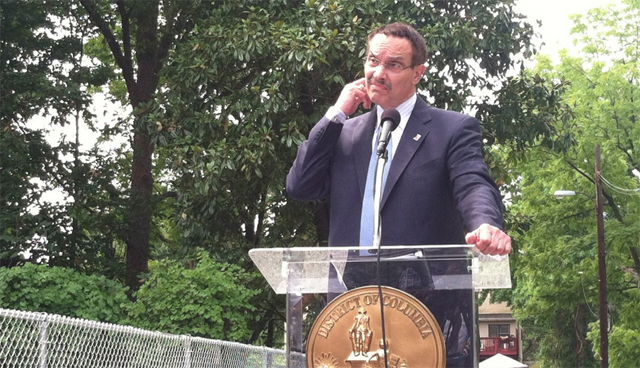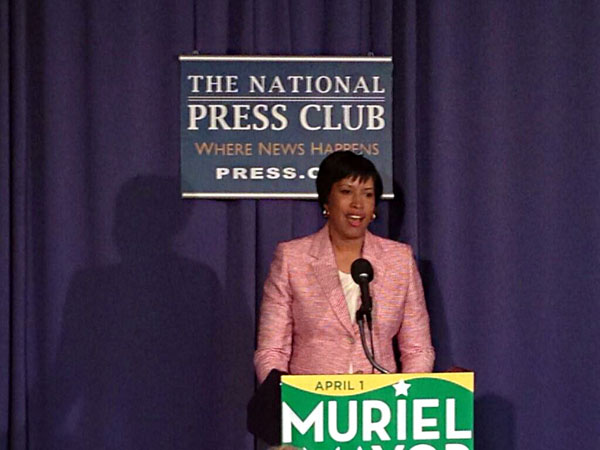WASHINGTON — Former D.C. Mayor Vincent Gray will not face federal charges after prosecutors announced Wednesday they have ended their investigation into his 2010 election campaign.
The long-running probe exposed an illegal $668,000 slush fund that helped elect Gray and defeat then-mayor Adrian Fenty in 2010. Six people who were involved in the campaign have pleaded guilty to felonies. But prosecutors were never able to establish that Gray committed a crime or knowingly conspired with his advisers.
The U.S. attorney’s office said in a statement Wednesday that there was insufficient evidence to continue.
Gray was not available to comment but his former campaign manager Chuck Thies released a statement from the long-serving politician:
“My life’s work has been dedicated to uplifting people. I ran for mayor to serve District residents. Today’s announcement from the U.S. Attorney ends a lengthy investigation. Here in the District and around the country many people have had their faith in our justice system tested. Justice delayed is justice denied, but I cannot change history. I look forward to getting on with the next chapter of my life, which will no doubt be dedicated to service.”
Thies called the announcement a relief and long overdue.
“This city was robbed of one of its finest public servants,” Thies said. “This is the kind of person who we should be celebrating, not the type of person whose reputation should be tarnished for political objectives.”
Thies said there was no reason to investigate Gray and Gray said repeatedly that he did nothing wrong.
Gray rejected a plea deal offer last fall that would have required him to plead guilty to one felony count.
The investigation started shortly after Gray took office in 2011 and overshadowed Gray’s entire four years in the mayor’s office. It was a major factor in his loss to current Mayor Muriel Bowser in last year’s Democratic primary.
The probe looked into contributions to local and federal political campaigns and found evidence of more than $3.3 million in illegal contributions to various campaigns between 2006 and 2011.
A total of 12 people have pleaded guilty to charges stemming from the investigation including D.C. businessman Jeffrey Thompson, who prosecutors has described as the architect of the shadow campaign that funneled money to Gray. Thompson and six others have yet to be sentenced.
Thompson admitted to secretly funneling money to pay for campaign activities in support of Gray’s 2010 election bid. Thompson pleaded guilty to two conspiracy charges a month before the 2014 Democratic primary and alleged that Gray knew about the off-the-books campaign.
The timing of the charges against Thompson, which had been expected for months, and Thompson’s claims were damning to Gray, who had no time to respond before voters headed to the polls, said Will Sommer, the Loose Lips columnist for the Washington City Paper.
And at the time, the assumption was that an indictment of Gray was imminent, Sommer said.
“As we’ve seen, that didn’t happen,” he said.
With the threat of federal charges gone, Gray could seek a return to public office. He might seek his old council seat representing Ward 7 or even consider a run for an at-large seat, said NBC4 political reporter Tom Sherwood.
Gray served as the council chair before he ran for mayor and worked for city government before he began his political career.
“Make no mistake there were crimes that occurred in 2010. The people who perpetrated them did an enormous disservice to Vince Gray because he was going to win that election anyway,” Thies said. “He didn’t need these people to do whatever it is they did. They were greedy, corrupt, power-hungry, scumballs.”
The illegal fund helped bridge the fundraising gap between Gray, who raised $1.7 million ahead of the 2010 Democratic primary, and then-Mayor Fenty, who raised $4.9 million. Gray defeated Fenty by 10 percentage points, fueled in part by high turnout and huge margins in poor, predominantly black neighborhoods east of the Anacostia River, where the shadow campaign was based. Then-U. S. Attorney Ronald Machen suggested that Gray’s victory was tainted, although pollsters said Gray almost certainly would have won without the shadow campaign.
By the time Thompson got involved in Gray’s campaign, he already had a playbook for funneling illegal money to his favored politicians, prosecutors said. He would bundle straw contributions from his employees, friends and relatives, later reimbursing them, and would also fund campaign activities by associates and their companies without reporting his contributions. Among the candidates who received such support from Thompson was Hillary Clinton in 2008. He also backed several D.C. Council members and candidates, including Michael Brown, now serving a prison term for bribery.
When he backed Gray, Thompson owned a managed-care firm that held the largest contract in city government, worth more than $300 million annually, and he presided over an accounting firm that received government contracts. Prosecutors said Thompson was counting on Gray to improve the climate for his businesses.
Gray said he promised nothing to Thompson, though he admitted he agreed to refer to the businessman as “Uncle Earl.” Gray explained the pseudonym by arguing that many of his supporters wanted to keep their identities hidden, fearing retaliation from Fenty.
Prosecutors alleged that Gray presented Thompson with a one-page budget for $425,000 and knew that the money wouldn’t be reported to the city’s campaign-finance office. But Gray maintained that he considered Thompson an ordinary campaign bundler and didn’t know he was breaking the law.
As mayor, Gray, was a detail-oriented technocrat who earned praise for his management of city finances. The city enjoyed low crime, an increasing population and a booming real estate market during his tenure, and Gray maintained the key school reform measures launched under Fenty.
However, the succession of Gray campaign aides who pleaded guilty and criminal convictions against three council members for unrelated crimes fueled perceptions that the local government was hopelessly corrupt even as the city thrived.
Councilwoman Mary Cheh, who once called for Gray to resign, says the District can move forward now that the cloud of suspicion that was hanging over Gray as well as the entire city has been lifted.
“When you have things like this hanging out there, it makes it harder and harder to connect with the people and say ‘we are not corrupt, we want good government, we want to represent them’.”
WTOP’s Megan Cloherty, Kristi King and Amanda Iacone plus The Associated Press contributed to this report.









